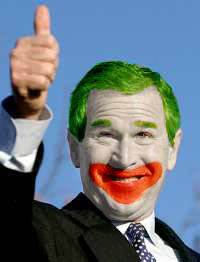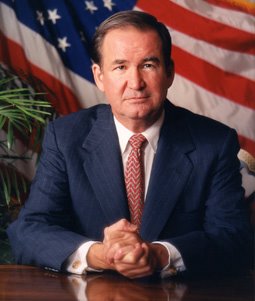
DON'T THINK THAT I'M NOT 'FAIR AND BALANCED"
LET SEE WHAT A COUPLE FAMOUS RIGHT WING CONSERVATIVES THINK OF BUSH.
HAHAHA
DAMN HE'S A SHITTY PRESIDENT.
CONSERVATIVE PAT BUCHANAN SLAMS BUSH

Bush Is Running Out of Alibis
by Patrick J. Buchanan
Posted Feb 03, 2006
"The road of isolationism and protectionism may seem broad and inviting, yet it ends in danger and decline," railed President Bush in his State of the Union. Again and again, Bush returned to his theme.
"America rejects the false comfort of isolationism. ...
"Isolationism would not only tie our hands in fighting enemies, it would keep us from helping our friends in desperate need. ...
"American leaders from Roosevelt to Truman to Kennedy to Reagan rejected isolation and retreat."
Why would a president use his State of the Union to lash out at a school of foreign policy thought that has had zero influence in his administration? The answer is a simple one, but it is not an easy one for Bush to face: His foreign policy is visibly failing, and his critics have been proven right.
But rather than defend the fruits of his policy, Bush has chosen to caricature critics who warned him against interventionism. Like all politicians in trouble, Bush knows that the best defense is a good offense.
Having plunged us into an unnecessary war, Bush now confronts the real possibility of strategic defeat and a failed presidency. His victory in Iraq, like the wars of Wilson and FDR, has turned to ashes in our mouths. And like Truman's war in Korea and Kennedy's war in Vietnam, Bush's war has left America divided and her people regretting he ever led us in. But unlike the world wars, Korea and Vietnam, Bush cannot claim the enemy attacked us and we had no choice. Iraq is Bush's war. Isolationists had nothing to do with it. To a man and woman, they opposed it.
Now, with an army bogged down in Afghanistan and another slowly exiting Iraq, and no end in sight to either, Bush seeks to counter critics who warned him not to go in by associating them with the demonized and supposedly discredited patriots of the America First movement of 1940-41. His assault is not only non-credible, it borders on the desperate and pathetic.
"Abroad, our nation is committed to a historic long-term goal. We seek the end of tyranny in our world," said Bush. "Some dismiss that goal as misguided idealism. In reality, the future security of America depends upon it."
Intending no disrespect, this is noble-sounding nonsense. Our security rests on U.S. power and will, and not on whether Zimbabwe, Sudan, Syria, Cuba or even China is ruled by tyrants. Our forefathers lived secure in a world of tyrannies by staying out of wars that were none of America's business. As for "the end of tyranny in our world," Mr. President, sorry, that doesn't come in "our world." That comes in the next.
"By allowing radical Islam to work its will, by leaving an assaulted world to fend for itself, we would signal to all that we no longer believe in our own ideals or even in our own courage," said Bush.
But what has done more to radicalize Islam than our invasion of Iraq? Who has done more to empower Islamic radicals than Bush with his clamor for elections across a region radicalized by our own policies? It is one thing to believe in ideals, another to be the prisoner of some democratist ideology.
Bush has come to believe that the absence of democracy is the cause of terror and democracy its cure. But the cause of terror in the Middle East is the perception there that those nations are held in colonial captivity by Americans and their puppet regimes, and that the only way to expel both is to use tactics that have succeeded from Algeria in 1962 to Anbar province in 2005.
Given the franchise, Arab and Islamic peoples from Pakistan to Iran, Iraq, Lebanon, Gaza, the West Bank and Egypt have now voted for candidates with two credentials. They seemed to be devout Muslims, and they appeared dedicated to tossing America out of the region and the Israelis into the sea.
With opposition also rising to his free-trade policy, Bush reverted to the same tactic: Caricature and castigate critics of his own failed policies. "Protectionists," said Bush, pretend "we can keep our high standards of living, while walling off our economy."
But it was protectionists from Lincoln to Coolidge who gave us the highest standard of living on earth. And the record of Bush's merry band of free-traders? The largest trade deficits in history, a $200 billion trade surplus for Beijing at our expense in 2005, and 3 million lost manufacturing jobs since Bush first took the oath.
If America is angry over what interventionism and free trade have wrought, George Bush cannot credibly blame isolationists or protectionists. These fellows have an alibi. They were nowhere near the scene of the crime.
It is George W. Bush who is running out of alibis.
http://www.humaneventsonline.com/article.php?id=12168
GODDAMN!!!
EVEN RIGHT WING " DOUCHEBAG HALL OF FAME MEMBER " ROBERT NOVAK TRASHES BUSH

The Real Bush?
by Robert Novak
Posted Feb 02, 2006
While jumping up on cue to cheer during the speech and delivering rave reviews afterward in the Capitol's Statuary Hall, conservative members of Congress were deeply disappointed by George W. Bush Tuesday night. It was not merely that the president abandoned past domestic goals. He appeared to be moving toward bigger government.
The consensus on the Right was that President Bush's fifth State of the Union Address was his worst. Republican congressmen agreed privately that he was most effective at the beginning with his familiar message of why U.S. forces cannot abandon Iraq. The problem for these lawmakers was the rest of the 51-minute presentation, which was filled with unpleasant surprises.
With polls showing the president's approval rating persistently anemic (as low as 39 percent), the speech aimed at a kinder, gentler Bush. But beyond atmospherics, the policy initiatives staked out new directions in the sixth year of his presidency that raised questions. Is this the real George W. Bush? Is he really his true father's son and not Ronald Reagan's?
The president seemed more comfortable with his foreign policy declarations than with what followed, but even here he did not live up to expectations. Pre-speech tips from White House aides and from Bush himself had pointed to laying down the law to the Iranian regime (step back from nuclear arms) and the Hamas party in Palestine (recognize Israel). He did so, but not with the force and specificity promised.
As expected, Bush backed away from what a year earlier were labeled as the two great initiatives of his second term. He complained that "Congress did not act last year on my proposal to save Social Security," unintentionally setting off self-congratulatory celebration by Democrats on the floor. But Bush made no promises about trying to revive his personal accounts. The president did not even give the comprehensive tax reform the courtesy of a death notice. It went unmentioned and apparently unmourned.
Prior to the speech, one conservative Republican senator fantasized about Bush turning to Democrats and calling on them to pass permanent tax cuts and then turning to Republicans and calling on them to cut spending. He did call for permanent tax cuts and for control over spending, but so briefly and undramatically that the president's demands lost their impact.
However, what bothered conservatives most about Tuesday night's performance was not what the president failed to do but what he actually did. The pre-speech public relations drumbeat had promised the president would deliver a new energy initiative to Americans angry about the price of gasoline. Indeed, Bush deplored that "America is addicted to oil, which is often imported from unstable parts of the world" and promised to end "our dependence on Middle Eastern oil." It was how he would accomplish this that stunned conservatives.
The president proposed that the government preside over a wide array of non-petroleum energy options. That has all the characteristics of an "industrial policy," with the federal government picking winners and losers. While violating the Republican Party's free market philosophy, this is a course with a lengthy pedigree of failure all over the world.
The same State of the Union address that neglected the Republican goal of reforming the tax system called for an American Competitiveness Initiative that also promises an extension of growing, intrusive government. That would expand still more the federal role in education. Instead of shrinking the federal government, Bush wants to grow it.
None of this change in direction will lead to a kinder, gentler Democratic Party in Congress. Tuesday night's response by newly elected Virginia Gov. Tim Kaine, while far more partisan than the president's speech, was relatively moderate and restrained. But it will not be Kaine with whom Bush must deal in this election. It is the fiercely partisan Ted Kennedy, Harry Reid, Dick Durbin, Nancy Pelosi and George Miller.
Bush's softer rhetoric can be stiffened as this year moves toward the serious business of midterm elections. But what happens to the blueprint for big government laid out by President Bush Tuesday night? That will not be easy to reverse.
http://www.humaneventsonline.com/article.php?id=12163



0 Comments:
Post a Comment
<< Home